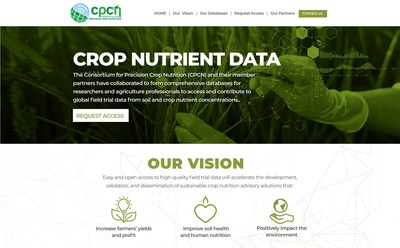Agricultural Research Leaders Worldwide Team Up to Launch Landmark Open Data Crop Nutrition Platform
Comunicato Precedente

Comunicato Successivo

The platform, which comprises two active databases, serves as a critical open data resource for agricultural researchers and professionals who conduct field trials on soil fertility and crop nutrition. Enabling these users to both contribute to and benefit from the datasets, the platform has already resulted in a published paper that estimates nutrient use and storage in maize.
Developed in partnership with the International Fertilizer Association (IFA) and Wageningen University & Research (WUR), the first of the two databases looks at production and environmental factors affecting nutrient concentrations to determine the total amount of nutrients removed from the field in the harvested portion of the crop. This provides agronomists and farm advisors with the information needed to improve their plant nutrition plans, delivering key efficiencies and critical yield increases. Focused initially on nutritionally and industrially important crops, such as maize, wheat, rice and soybean, the Global Crop Nutrient Removal Database includes data on nutrient content, residues, crop yields and other associated data.
The second resource, The Nutrient Omission Trial Database, is focused on crop nutrient requirements. Created in collaboration with the IFA, the African Plant Nutrition Institute (APNI), and Innovative Solutions for Decision Agriculture, this database includes data from researchers and institutes around the globe. It aims to support site-specific recommendations on optimizing nutrient management by enabling researchers to compare crop nutrient requirements and plans.
"The information collected via this database will be invaluable in improving our understanding of ongoing trends in crop nutrient uptake and removal," explains Achim Dobermann, IFA Chief Scientist. "This will make it easier to create decision support systems to determine how to optimize crop production in a sustainable way, under changing environmental conditions, ultimately facilitating positive long-term changes in how these processes are managed across the industry."
Both CPCN databases are underpinned by the innovative Agmatix platform, designed to aggregate, standardize, and harmonize agronomic data. Agmatix has also used its complex algorithms to enrich the datasets with site-specific data, such as weather and geospatial information on soils and crops. The Agmatix Insights solution provides registered users direct access via an intuitive interface that allows for full exploration of the databases using pre-built statistical tools.
"Promoting open science is incredibly important to us. Only through collaboration can we progress the agricultural industry as fast as needed to meet the rising demand for food, which will always be at the core of what we do here at Agmatix," comments Ron Baruchi, CEO of Agmatix.
The wide-scale provision of research data, enabled through both Global Crop Nutrient Databases, is set to advance scientific development of the sector, whilst also marking a positive step towards multiple UN Sustainable Development Goals, such as reducing hunger and poverty in a sustainable manner. As well as being able to contribute data through the platform, researchers can use the datasets to perform meta-analyses, empowering deeper insights from their own data across different trial locations and fertilizer types.
"Being part of this project enables us to develop and disseminate evidence-based and sustainable crop nutrient management solutions in response to the changing climatic and weather conditions faced by farmers across Africa," explains Dr. Pauline Chivenge, Principal Scientist, APNI & CPCN Coordinator.
Jamie Collinson, CTO, iSDA, concludes: "The data we're able to collect via this platform is a critical to our digital advisor for smallholders, Virtual Agronomist. We are delighted to see the community coming together to create a shared resource which will elevate what's possible across the whole ag-tech ecosystem."
To read more about the project, collaborations and how the databases can be used, please visit the microsite at http://cropnutrientdata.net or contact us via [email protected].

COORDINATING PARTNERS
The following partners coordinated the contribution of crop nutrient concentrations research data from across the globe.
The Consortium for Precision Crop Nutrition (CPCN) was established by the African Plant Nutrition Institute (APNI) in 2020 to co-create common data, standards and resources that enable its members to develop, validate and disseminate their own customized nutrient management solutions.
Wageningen University & Research (WUR) is a public university in Wageningen, Netherlands, specializing in technical and engineering subjects, life science and is widely regarded as the world's top agricultural research institution.
The International Fertilizer Association (IFA) promotes the efficient and responsible production, distribution and use of plant nutrients. This mission plays a critical role in helping to feed the world sustainably. Members include fertilizer producers, traders and distributors, service providers, research organizations, agtech start-ups and non-governmental organizations
The African Plant Nutrition Institute (APNI) is a not-for-profit research and development organization founded in 2019 and based in Benguérir, Morocco. Their mission is to enable African farmers to sustainably manage crop nutrition for a resilient and food-secure Africa.
Innovative Solutions for Decision Agriculture (iSDA) helps smallholder farmers across Africa increase their productivity using advanced technologies while also improving their profitability and well-being of their communities.
Agmatix is the world's first single engine that drives the agronomic innovation cycle from research and experimental data into meaningful insights. The Agmatix platform can read and interpret thousands of the different data points commonly used across the agricultural industry to help scientists, agronomists and farmers make actionable decisions.
For more information on Agmatix, please visit www.agmatix.com
Photo: https://mma.prnewswire.com/media/1882527/Agmaticrop_nutrition.jpg





